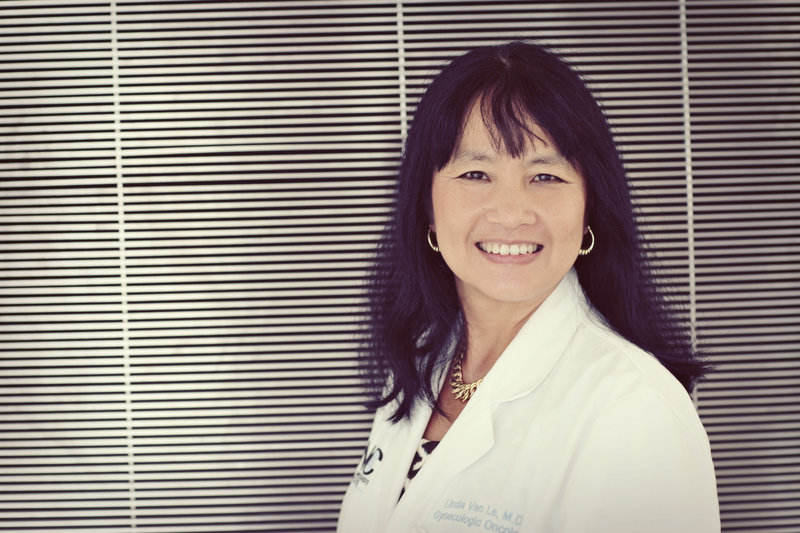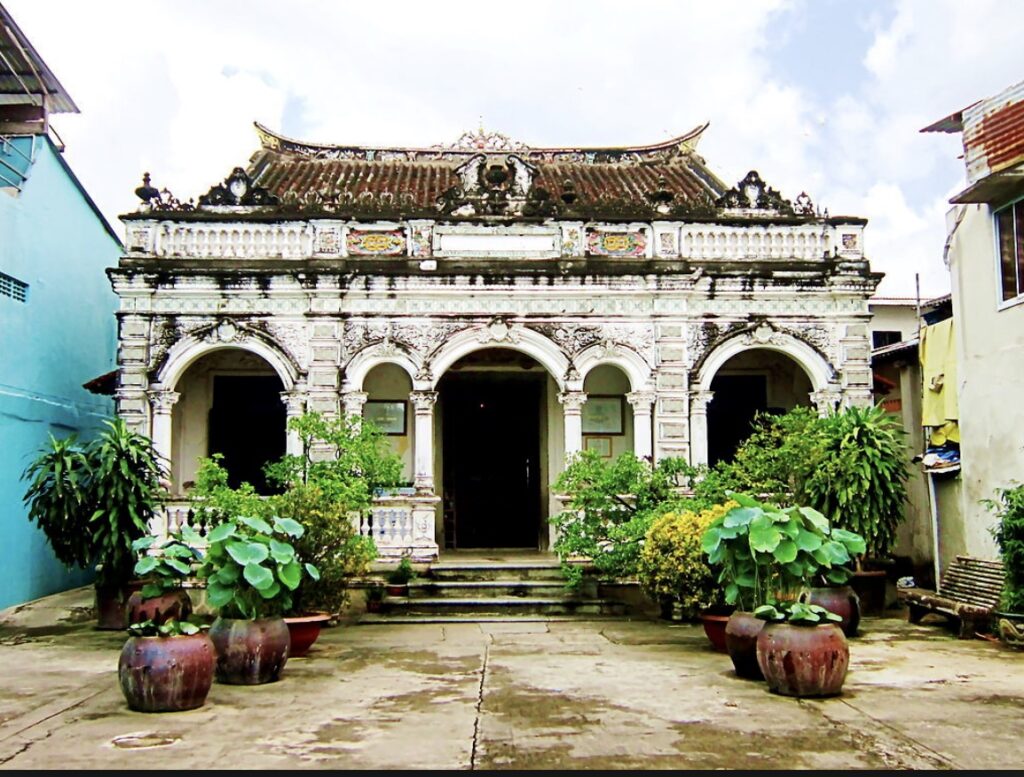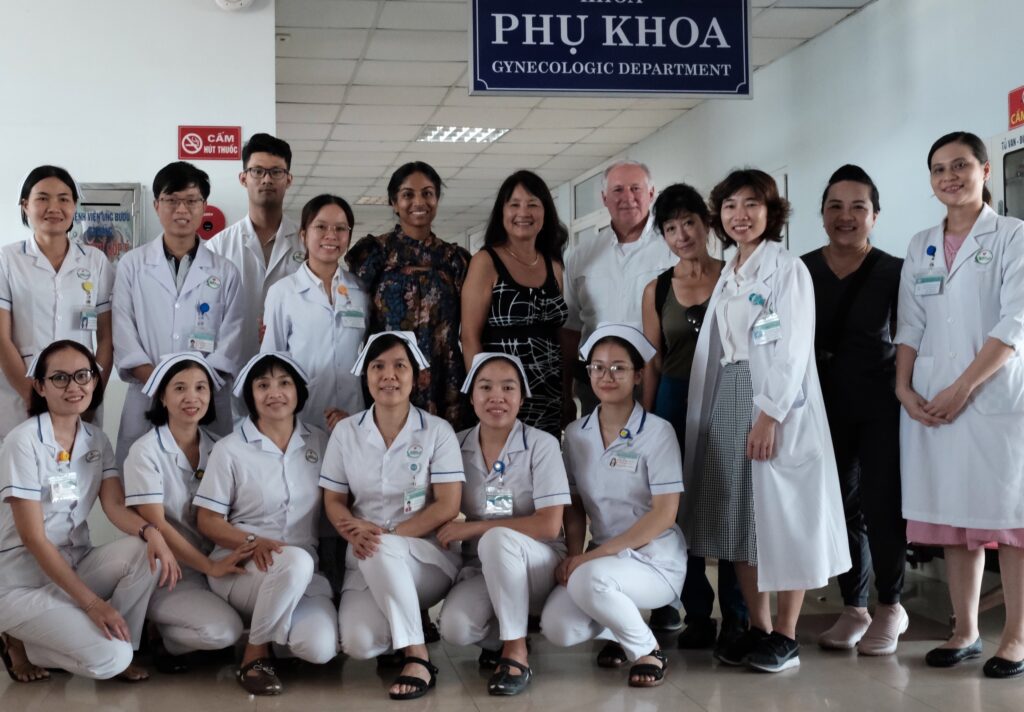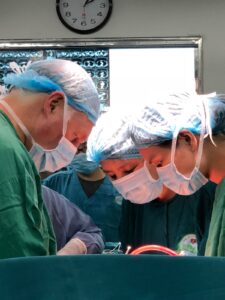Linda Van Le, MD, is the Leonard D. Palumbo Distinguished Professor of Gynecologic Oncology, and a first generation Vietnamese American who is passionate about training the next generation. Dr. Van Le is a mentor for the International Gynecologic Cancer Society’s Global Gynecologic Oncology Fellowship Program, in Danang, Vietnam. Her grandfather’s home in Sadec is known as “The Lover’s House,” made famous by a book by Marguerite Duras, which she wrote about their relationship.

How did you choose your specialty in oncology?
When I was a medical student, I was not interested in Ob/Gyn as a specialty, but this changed during the very last rotation of my third year in medical school. I was moved by the patients, as well as by the passionate and dedicated residents. Almost all of the residents were women–super women! They were smart, gracious and excellent surgeons. I wanted to be like them.
What was your pathway?
I was born in Los Angeles, CA. A friend of mine wanted to go to Stanford. I had no idea where it was, but because she was my best friend, I applied and was accepted. I graduated in two and a half years, and proceeded to the University of California San Francisco School of Medicine and subsequent residency in Ob/Gyn. I was 16 years old when I started college as a freshman, and 19 years old when I was accepted to medical school.
Where are you from? Tell us about your family.
My family moved to the U.S. from Vietnam, before I was born. My father was the first Vietnamese to attend MIT, and after that he worked in the aerospace industry on life support systems for the early Gemini and Mercury spaceships. He also worked on the engine for the Concorde. My mother was a pharmacist, and she attended the Sorbonne University in Paris. We had a comfortable life. But then, my father died when I was six years old, from a congenital aneurysm, and we became an immigrant single-mother family.
My maternal grandfather’s family was very respected and powerful. The family seat was in Sadec, Vietnam, which is three hours south of Ho Chi Minh, situated on a branch of the Mekong River. They had a huge, beautiful house with a roof rumored to be painted in gold leaf. I spent summers there visiting my grandparents during the Vietnam War. We would drive from Ho Chi Minh to Sadec, and pass war zones and destruction. Once at the Sadec house though, it was like a throwback to old times. There were servants, no indoor bathrooms, and we had this beautiful huge house (although no air conditioning). There was a beautiful tiled shower room where water was collected in a big cistern for bathing. The kitchen was outdoors under a roof, and so much fun. You could walk down to the kitchen and always find something happening, with a big fire in a hearth that was used for cooking.

As a young man, my grandfather, Huynh Thuy Le, fell in love with Marguerite Duras; however, his family had an arranged marriage planned for him. When Miss Duras returned to France, she wrote a book about their relationship called The Lover. She was also awarded the Prix Goucourt, France’s highest literary award, and I’ve heard the book is required reading for some college courses. There is also a movie. It was because of this story that our Sadec house was preserved, and can be visited today. It is known as “The Lover’s House” and you can find it on YouTube. If you really want to experience it, you can stay in the house. One of the rooms available is the room I used to sleep in.
Tell us about your global health work in Vietnam.
I am an international mentor for the International Gynecologic Cancer Society’s Global Gynecologic Oncology Fellowship Program, in Danang, Vietnam (central Vietnam). Along with my two co-mentors, we are responsible for training a local gynecologists to become gyn oncologists, who in turn will be able to serve the community. We travel to Vietnam twice a year to operate, see patients and teach chemotherapy. We also run a monthly tumor board for the Danang site, where gynecologist oncologists and pathologists from all over the U.S. and Asia come together to review cancer cases. To date, we have graduated two amazing women gyn oncologists from this program and we are very proud of them.
What do you find most rewarding about your work?
The surgical and medical aspects are so interesting. There’s screening, surgery, chemotherapy, medical management of cancer complications, understanding genetics, and palliative care. I enjoy caring for my patients and listening to their concerns, and being able to apply the newest treatments to improve their conditions.

What are some of the new developments that you’re excited about?
There are some very exciting developments in immunotherapy. Outcomes are getting better and survival is improving.

Is there a particular achievement (professional or personal) that has been most gratifying to you?
In 2017, I met with Vivian Go, PhD, and Irving Hoffman, PA, MPH, about global health opportunities, and they offered guidance. Today, I’m a mentor for UNC Project Vietnam. I’m also an advisor for the NCI Cervical Cancer Working Group. It is very gratifying to use one’s knowledge and overall skills to impact women’s health internationally. I was also asked to edit a well-known textbook on gynecologic surgery, Te Linde’s Operative Gynecology. My colleague Vicki Handa was a resident with me, and is my co Editor. We have enjoyed educating gynecologists around the world on the best way to perform surgery. The textbook has been translated into several languages.
What hobbies do you enjoy?
I can’t say that I can cook or bake very well, which seem to be common hobbies, but I love playing pickleball with friends. I have a little Maltese Mix who I spend time with.
What was the last book you read?
I read cookbooks to see if there is something I can actually cook, and travel books about new places to visit. I check in with Apple news a couple times a day to see what’s happening to Harry and Megan.
The Institute for Global Health & Infectious Diseases (IGHID) attracts people who are driven to make big change. From principal investigators and grant managers to regulatory specialists and study coordinators, everyone has an important role to play in what we do around the world. We are pleased to highlight the work of the people who proudly serve IGHID.
